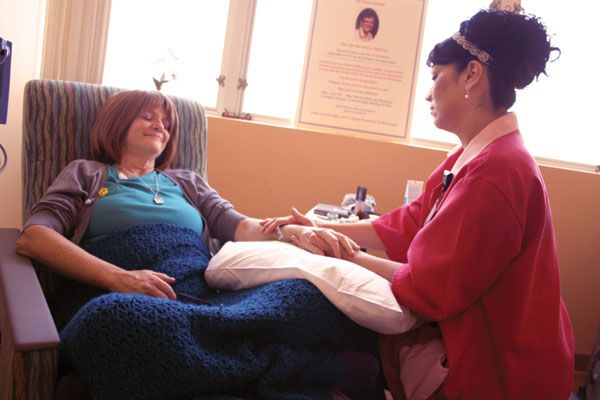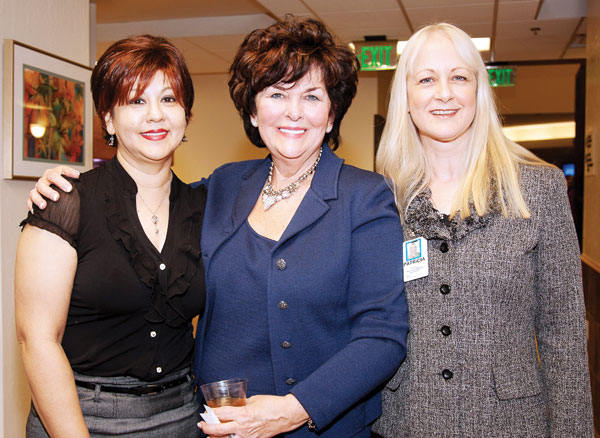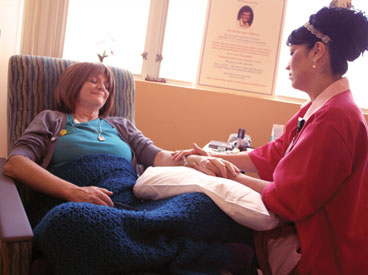
Charlotte Mae McCracken was in her late 50s when she was diagnosed with stage 4 breast cancer. The illness quickly spread to her lungs and then to her brain, ravaging her entire body. She was so weakened that she was restricted to her house, on oxygen, and unable to even cook for herself. There was no hope.
“The last year of her life was pure hell,” recalls her sister Barbara MacLean. “And she felt and looked like it. The worst part was seeing this woman who had done so much sit in a chair in her living room, waiting to die. For the first time in her life, I saw her hopeless.”
One day, Barbara, desperately seeking some way to help, had an idea. She asked Charlotte if it would be OK to do her makeup. “I said, ‘Let’s go play. I want to make you look better.’”
Her sister replied, “You can’t make me look better—it’s too late.” But after a little coaxing, she relented, mostly for Barbara’s sake. So weak was Charlotte that she could barely sit up or hold her eyes open. Finally, when she did open her eyes, she looked in the mirror in disbelief. Her emaciated face looked beautiful for the first time in years, and it made her feel as if life, too, was beautiful again.
“I look pretty—take my picture!” she exclaimed. Barbara gently dressed her with scarves, hats, and a fun, old fur cape. And after the photos were snapped, Charlotte looked at her sister and said, “Promise me you will do this for others when I am gone.”
The two sisters hugged, and with tears in her eyes, Barbara said, “I promise.”
Charlotte passed later that year but spent her remaining days with a smile on her face and a lightened heart. “She cared about herself again,” recalls Barbara. “And I never saw her sit in that chair in her living room again—instead she moved out onto the sunny porch in her backyard.”
After Charlotte’s death, Barbara kept her promise in a big way. A successful interior designer for 18 years who owned her own furnishings store, she gave it all up. “The day my sister died I called my store and told them to sell everything,” explains Barbara. “I didn’t want to live my old life anymore. Charlotte gave me a greater purpose; I wanted to do something to help others.”

Barbara launched the Face in the Mirror Foundation in 2004. The nonprofit organization is dedicated to the outer well-being of cancer patients to help them overcome their inner battle and ultimately “to smile back at cancer.” She had planned to start small, approaching a local hospital with an outline of her mission. She figured they’d allow her to work with one patient at a time, but just a few days after her first visit to the hospital, she was invited to return and treat all their cancer patients. Word spread about the project, and out of the blue, cosmetics firm Arbonne International made a generous donation. “I came home one day to find almost $100,000 of free makeup on my front doorstep,” recalls Barbara.
Barbara began with just one volunteer, then two, and nine years later, 30. Now Face in the Mirror serves hospitals, hospices, and cancer wards throughout Arizona. From doing women’s makeup to shaving and cutting men’s hair to fitting children with wigs, her message of beauty in the face of tragedy has made Barbara realize she is not only keeping her promise to make patients beautiful but to make them whole again in their hearts. And that has made Barbara whole as well.
“Cancer is so draining, but we fill people up again,” explains Barbara. “Knowing that fills me up, too.”
That has made Barbara recognize something else as well—that her sister gave her much more than just a promise to keep.
“I realized that this is my life’s calling,” reveals Barbara. “And I will keep this promise for as long as I can to as many other cancer victims as I can.”
One Patient’s Story
One of the patients who experienced the magic of an unexpected Face in the Mirror makeover is Susan Castaneda. At age 50, she was diagnosed with stage 4 ovarian cancer. First there were the surgeries, then the chemotherapy, and then there was the other stuff—the stuff we are not supposed to care about when facing a life and death situation: “For a woman, to lose her hair is devastating,” explains Susan. “She loses her identity.”
Lying in her hospital bed on a ventilator, barely able to speak, she knew she looked horrible. “I told my family not to come,” reveals Susan. “I looked like I was dying. I knew it would kill them to see me like that.”
But as Susan slumped in her hospital bed feeling sorry for herself, in walked a miracle in an unexpected form—a young, tall blonde with a baby face and a kind smile, toting a little rolling suitcase behind her. “She looked so beautiful,” recalls Susan. “I remember thinking how much I wanted to look like her again.”
“Would you mind if I offer you a massage and a facial?” the stranger asked with a warm smile.
“I remember thinking, This is ridiculous,” reveals Susan. “But there was something soothing about her voice and her energy. I figured what could it hurt?”
After a hand-and-foot massage, Patricia applied foundation to brighten Susan’s pale skin. Then there was some blush that helped highlight her beautiful smile. Some eye shadow distracted from her sunken eyelids and a little lipstick for a finishing touch. Then she fitted her for a wig. After almost an hour of pampering, she gave Susan a mirror and asked her what she thought.
“I said, ‘I love it,’” recalls Susan. “I went from feeling like, ‘Why me?’ to ‘Wow, it’s me!’ She made me feel beautiful again.”
It turned out that the angelic visitor was a cancer survivor herself—seven years earlier, she’d been given weeks to live. Patricia had also received a surprise visit from the Face in the Mirror Foundation, and was now a regular volunteer with the organization.
From that moment on, Susan made a point to wake up every day and put her makeup on. But an even deeper feeling began to come over her. “Suddenly,
I wanted to live again,” says Susan. “The cancer to me meant death, but here was this woman offering hope and life. She cared enough to make me look alive again, and I really felt alive again.”
Watch a video to learn more about Face in the Mirror Foundation.
Become a Saturday Evening Post member and enjoy unlimited access. Subscribe now



